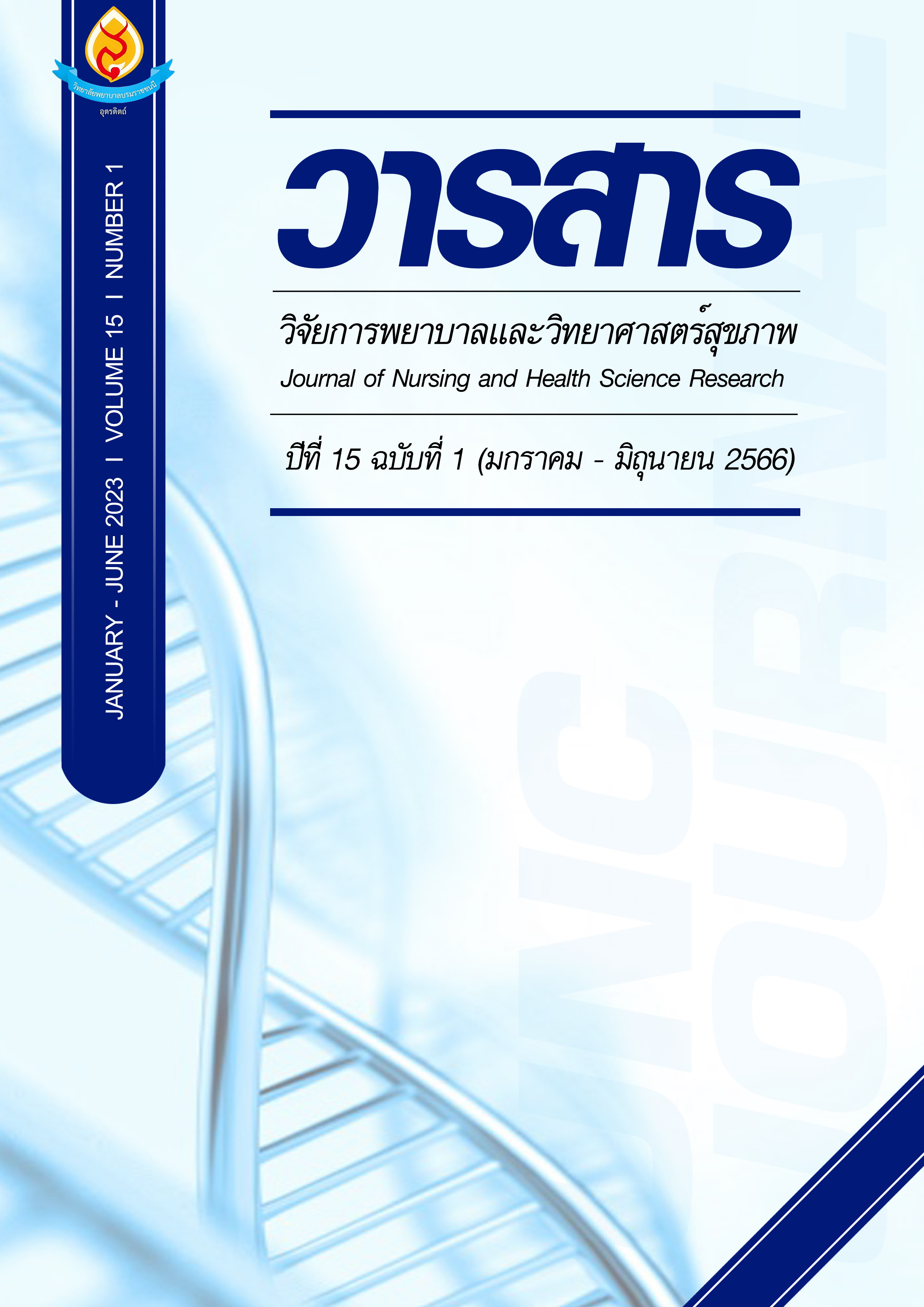ประสบการณ์การจัดการตนเองช่วงโควิด-19 ระบาด ของผู้ป่วยเบาหวานชนิดที่ 2 ในเขตรับผิดชอบของโรงพยาบาลส่งเสริมสุขภาพตำบลบ้านนาขุม
Main Article Content
บทคัดย่อ
การวิจัยเชิงคุณภาพแบบปรากฏการณ์วิทยาครั้งนี้มีวัตถุประสงค์เพื่อศึกษาประสบการณ์การจัดการตนเองช่วงโควิด-19 ระบาด ของผู้ป่วยเบาหวานชนิดที่ 2 ที่อยู่ในเขตความรับผิดชอบของ รพ.สต.บ้านนาขุม เก็บรวบรวมข้อมูลโดยการสัมภาษณ์แบบเชิงลึกผู้ป่วยเบาหวาน จำนวน 25 คน วิเคราะห์ข้อมูลโดยการวิเคราะห์เชิงเนื้อหา ผลการวิจัยพบว่าผู้ป่วยเบาหวานชนิดที่ 2 ที่อยู่ในเขตความรับผิดชอบของ รพ.สต.บ้านนาขุม มีประสบการณ์การจัดการตนเองช่วงโควิด-19 ระบาด มี 2 ประเด็นหลัก ได้แก่ 1) การปรับเปลี่ยนพฤติกรรมสุขภาพเพื่อให้สามารถควบคุมโรคเบาหวานได้ด้วยตนเอง ไม่ว่าจะเป็นการรับประทานอาหารคนเดียว การออกกำลังกายตามลำพัง การจัดการเรื่องยาและการจัดการความเครียด และ 2) การปรับเปลี่ยนวิถีดำเนินชีวิตเพื่อไม่ให้ติดเชื้อโควิด-19 ได้แก่ การระมัดระวังการเข้าสังคมและการระมัดระวังการใช้จ่าย ผลการศึกษานี้สามารถนำไปเป็นข้อมูลพื้นฐานสำหรับการวางแผนการพัฒนาแนวทางในการส่งเสริมการจัดการตนเองช่วง โควิด-19 ระบาดของผู้ป่วยเบาหวานชนิดที่ 2 ในเขตรับผิดชอบของโรงพยาบาลส่งเสริมสุขภาพตำบลบ้านนาขุม โดยปรับการให้บริการและกิจกรรมให้เหมาะสมกับสภาพปัญหาของผู้ป่วยต่อไป
Article Details

อนุญาตภายใต้เงื่อนไข Creative Commons Attribution-NonCommercial-NoDerivatives 4.0 International License.
บทความหรือข้อคิดเห็นใดใดที่ปรากฏในวารสารวิจัยการพยาบาลและวิทยาศาสตร์สุขภาพ เป็นวรรณกรรมของผู้เขียน ซึ่งบรรณาธิการหรือสมาคมศิษย์เก่า ไม่จำเป็นต้องเห็นด้วย และบทความที่ได้รับการตีพิมพ์เผยแพร่ถือเป็นลิขสิทธิ์ของวารสารวิจัยการพยาบาลและวิทยาศาสตร์สุขภาพ
เอกสารอ้างอิง
Agarwal, N., Harikar, M. M., Shukla, R. & Bajpai, A. (2020). Perceived stress among Indian children and young adults living with type 1 diabetes during the COVID-19 outbreak [Preprint]. https://doi.org/10.21203/rs.3.rs-33172/v1
Ban Na Khum Health Promoting Hospital. (2019). Annual report 2019. Phtsanulok: Ban Na Khum Health Promoting Hospital. (in Thai).
Black, S., Maitland, C., Hilbers, J. & Orinuela, K. (2017). Diabetes literacy and informal social support: A qualitative study of patients at a diabetes centre. Journal of Clinical Nursing, 26(1–2), 248–257. https://doi.org/10.1111/jocn.13383
Charungthanakij, N. (2021). Outcomes of glycemic control in patients with type 2 diabetes receiving new services from diabetes clinic, Sai Ngam Hospital during COVID-19 pandemic. Regional Health Promotion Center 9 Journal, 15(36), 129–142. (in Thai).
Emergency Operation Center, Department of Disease Control, Ministry of Public Health. (2021). Work from home. Retrieved (2022, November13). from https://www.hfocus.org/content/2021/04/21412 (in Thai).
Grady, P. A. & Gough, L. L. (2014). Self-management: A comprehensive approach to management of chronic conditions. American Journal of Public Health, 104(8), e25– e31. https://doi.org/10.2105/AJPH.2014.302041
Kachintorn, U. (2021). Universal precaution. Retrieved (2022, November13). from https://www.niems.go.th/1/News/Detail/8232?group=21 (in Thai).
Kirdmanee, B., Tumtavitikul, S., Wachirasurong, Y., Sukbot, B. & Teekasap, S. (2020). Concepts and guidelines for solving covid-19. Advanced Science Journal, 20(1), 1–12. (in Thai).
Mukona, D. M. & Zvinavashe, M. (2020). Self- management of diabetes mellitus during the Covid-19 pandemic: Recommendations for a resource limited setting. Diabetes & Metabolic Syndrome, 14(6), 1575–1578. https://doi.org/10.1016/j.dsx.2020.08.022
Nassar, M., Daoud, A., Nso, N., Medina, L., Ghernautan, V., Bhangoo, H., Nyein, A., Mohamed, M., Alqassieh, A., Soliman, K., Alfishawy, M., Sachmechi, I. & Misra, A. (2021). Diabetes mellitus and COVID-19: Review article. Diabetes & Metabolic Syndrome, 15(6), 102268– 102268. https://doi.org/10.1016/j.dsx.2021.102268
Paulsamy, P., Ashraf, R., Alshahrani, S. H., Periannan, K., Qureshi, A. A., Venkatesan, K., Manoharan, V., Govindasamy, N., Prabahar, K., Arumugam, T., Venkatesan, K., Chidambaram, K., Kandasamy, G., Vasudevan, R. & Krishnaraju, K. (2021). Social support, self-care behaviour and self-efficacy in patients with Type 2 diabetes during the COVID-19 pandemic: A cross-sectional study. Healthcare (Basel, Switzerland), 9(11), 1607. https://doi.org/10.3390/healthcare9111607
Peng, X., Chen, Y., Deng, L., Liu, Q., Li, Q., Xiong, J., Shi, Y. & Tang, S. (2020). Clinical features of critically ill patients infected with SARS-CoV-2 outside Wuhan with and without diabetes. International Journal of Diabetes in Developing Countries, 40(4), 482–490.
https://doi.org/10.1007/s13410-020-00888-3
Phitsanulok. (2021). Epidemic prevention measures 2019 or COVID-19. Retrieved (2022, November 13). from http://phitsanulok.go.th/COVID19/wp- content/uploads/2021/09/phitsanulok7298_17September21.pdf. (in Thai).
Phitsanulok Provincial Public Health Office. (2019). Annual report 2019. Retrieved (2022, November 13). from https://cloud.plkhealth.go.th/index.php/s/GG2gBBCkiJDABs6. (in Thai).
Pleym, K., Iversen, M. M. & Broström, A. (2022). Experiences and actions related to living with type 1 diabetes during the COVID-19 pandemic in Norway: A qualitative study conducted during July to December 2020. BMJ Open, 12(4), e056027. https://doi.org/10.1136/bmjopen-2021-056027
Renjith, V., Yesodharan, R., Noronha, J. A., Ladd, E. & George, A. (2021). Qualitative methods in health care research. International Journal of Preventive Medicine, 12, 20–20. https://doi.org/10.4103/ijpvm.IJPVM_321_19
Singhai, K., Swami, M. K., Nebhinani, N., Rastogi, A. & Jude, E. (2020). Psychological adaptive difficulties and their management during COVID-19 pandemic in people with diabetes mellitus. Diabetes & Metabolic Syndrome, 14(6), 1603–1605. https://doi.org/10.1016/j.dsx.2020.08.025
Sujan, Md. S. H., Tasnim, R., Islam, Md. S., Ferdous, Most. Z., Apu, Md. A. R., Musfique, Md. M. & Pardhan, S. (2021). COVID-19-specific diabetes worries amongst diabetic patients: The role of social support and other co-variates. Primary Care Diabetes, 15(5), 778–785. https://doi.org/10.1016/j.pcd.2021.06.009
Suwannakit, S., Wanchai, A., Sangkhamkul, C. & Poonsub, A. (2021). Self-management behaviors of persons with type 2 diabetes living in urban area. Boromarajonani College of Nursing, Uttaradit Journal, 13(1), 225–237. (in Thai).
Xin, Y., Duman, E. K., Yan, X., Gong, E., Xiong, S., Chen, X., Østbye, T. & Yan, L. L. (2022). Economic hardships from COVID-19 and its association with socioeconomic factors and diabetes management indicators: A cross-sectional study. Heliyon, 8(5), e09461. https://doi.org/10.1016/j.heliyon.2022.e09461


